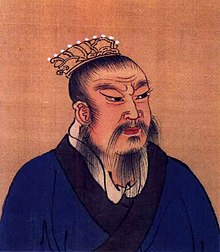
Back غاوزو إمبراطور هان Arabic جاوزو امبراطور هان ARZ Liu Bang AST قائوزو (ایمپیراتور) AZB Лю Бан Bashkir Лю Бан Byelorussian Хан Гаодзу Bulgarian ལིའུ་པང་། Tibetan Emperador Gaozu de Han Catalan Làu Băng CDO
This article has multiple issues. Please help improve it or discuss these issues on the talk page. (Learn how and when to remove these template messages)
|
| Emperor Gaozu of Han 漢高祖 | |||||||||||||
|---|---|---|---|---|---|---|---|---|---|---|---|---|---|
 Posthumous depiction from the Ming dynasty | |||||||||||||
| Emperor of the Han dynasty | |||||||||||||
| Reign | 28 February 202[1] – 1 June 195 BC | ||||||||||||
| Predecessor | Qin Er Shi (Qin dynasty) | ||||||||||||
| Successor | Emperor Hui | ||||||||||||
| King of Han | |||||||||||||
| Reign | c. March 206[2] – 28 February 202 BC | ||||||||||||
| Born | 256 BC[3] Feng, Pei, State of Chu[4] | ||||||||||||
| Died | 1 June 195 BC (aged 61) Chang'an, Han dynasty | ||||||||||||
| Burial | Chang Mausoleum (長陵) | ||||||||||||
| Consorts | Empress Lü Empress Gao Consort Cao Consort Qi Lady Zhao | ||||||||||||
| Issue | Liu Fei, King Daohui of Qi Emperor Hui of Han Liu Ruyi, King Yin of Zhao Emperor Wen of Han Liu Hui, King of Liang Liu You, King of Huaiyang Liu Chang, King Li of Huainan Liu Jian, King of Yan Princess Yuan of Lu | ||||||||||||
| |||||||||||||
| House | Liu | ||||||||||||
| Dynasty | Han (Western Han) | ||||||||||||
| Father | Liu Tuan | ||||||||||||
| Mother | Wang Hanshi | ||||||||||||
| Emperor Gaozu of Han | |||||||||||||||||||||||||||||
|---|---|---|---|---|---|---|---|---|---|---|---|---|---|---|---|---|---|---|---|---|---|---|---|---|---|---|---|---|---|
| Traditional Chinese | 漢高祖 | ||||||||||||||||||||||||||||
| Simplified Chinese | 汉高祖 | ||||||||||||||||||||||||||||
| Literal meaning | "High Ancestor of Han" | ||||||||||||||||||||||||||||
| |||||||||||||||||||||||||||||
| Liu Bang (personal name) | |||||||||||||||||||||||||||||
| Traditional Chinese | 劉邦 | ||||||||||||||||||||||||||||
| Simplified Chinese | 刘邦 | ||||||||||||||||||||||||||||
| |||||||||||||||||||||||||||||
Emperor Gaozu of Han (Chinese: 漢高祖;[a] 256 – 1 June 195 BC),[5] also known by his given name Liu Bang (劉邦), was the founder and first emperor of the Han dynasty, reigning from 202 to 195 BC. He is considered by traditional Chinese historiography to be one the greatest emperors in history, credited with establishing the Pax Sinica, one of China's longest golden ages.[not verified in body]
Liu Bang was among the few dynastic originators to have born into a peasant family.[6] He initially entered the Qin dynasty bureaucracy as a minor law enforcement officer in his home town Pei County, within the conquered state of Chu. During the political chaos following the death of Qin Shi Huang, who had been the first emperor in Chinese history, Liu renounced his civil service position and became a rebel leader taking up arms against the Qin. He outmanoeuvred rival rebel leader Xiang Yu to invade the Qin heartland and forced the surrender of the Qin ruler Ziying in 206 BC.
After the fall of the Qin, Xiang Yu, as the de facto chief of the rebels, divided the former Qin empire into the Eighteen Kingdoms, with Liu Bang forced to accept control of the poor and remote region of Bashu (present-day Sichuan, Chongqing, and southern Shaanxi), and assuming the title "King of Han". Within the year, Liu Bang broke out with his army and conquered the Three Qins, which started the Chu–Han Contention, a civil war between various forces seeking to inherit the Qin's former supremacy over China.
In 202 BC, Liu Bang emerged victorious following the Battle of Gaixia, unified most of China under his control, and established the Han dynasty with himself as the founding emperor. During his reign, Liu Bang reduced taxes and corvée labor, promoted Confucianism, and suppressed revolts by the lords of non-Liu vassal states, among many other actions. He also initiated the policy of heqin to maintain a de jure peace between the Han and the Xiongnu following the Han defeat at the Battle of Baideng in 200 BC. He died in 195 BC and was succeeded by his son, Liu Ying.
- ^ According to Liu Bang's biography in Book of Han, he was crowned emperor on the jiawu day of the 2nd month of the 5th year of his reign (including his tenure as King of Han). This corresponds to 28 Feb 202 BC in the proleptic Julian calendar.
- ^ According to Liu Bang's biography in Book of Han, he was created King of Han in the 2nd month of the 1st year of his reign (including his tenure as King of Han). This corresponds to 12 Mar to 10 Apr 206 BC in the proleptic Julian calendar.
- ^ This is the birth year reported by Huangfu Mi (皇甫謐) (215–282 AD).
- ^ 李祖德 (2012). "刘邦祭祖考——兼论春秋战国以来的社会变革". 中国史研究 [Journal of Chinese Historical Studies]. 34 (3). CNKI: 11–58.
- ^ According to Liu Bang's biography in Book of Han, he died on the jiachen day of the 4th month of the 12th year of his reign (including his tenure as King of Han). This corresponds to 1 Jun 195 BC in the proleptic Julian calendar.
- ^ "Gaozu Emperor of Han Dynasty". Encyclopædia Britannica.
Cite error: There are <ref group=lower-alpha> tags or {{efn}} templates on this page, but the references will not show without a {{reflist|group=lower-alpha}} template or {{notelist}} template (see the help page).
© MMXXIII Rich X Search. We shall prevail. All rights reserved. Rich X Search